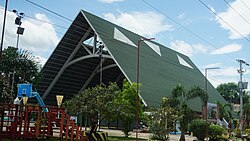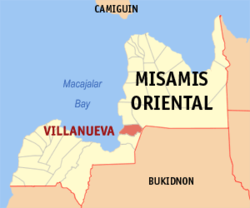Villanueva, officially the Municipality of Villanueva (Cebuano: Lungsod sa Villanueva; Tagalog: Bayan ng Villanueva), is a 2nd class municipality in the province of Misamis Oriental, Philippines. According to the 2020 census, it has a population of 40,419 people.[3]
Villanueva | |
|---|---|
| Municipality of Villanueva | |
 Villanueva Municipal Covered Court | |
 Map of Misamis Oriental with Villanueva highlighted | |
Location within the Philippines | |
| Coordinates: 8°35′N 124°47′E / 8.58°N 124.78°E | |
| Country | Philippines |
| Region | Northern Mindanao |
| Province | Misamis Oriental |
| District | 2nd district |
| Founded | June 16, 1962 |
| Barangays | 11 (see Barangays) |
| Government | |
| • Type | Sangguniang Bayan |
| • mayor of Villanueva[*] | Jennie Rosalie T. Uy |
| • Vice Mayor | Edwin C. Dagasuhan |
| • Representative | Yevgeny Vincente B. Emano |
| • Municipal Council | Members |
| • Electorate | 25,495 voters (2022) |
| Area | |
• Total | 48.80 km2 (18.84 sq mi) |
| Elevation | 93 m (305 ft) |
| Highest elevation | 578 m (1,896 ft) |
| Lowest elevation | 0 m (0 ft) |
| Population (2020 census)[3] | |
• Total | 40,419 |
| • Density | 830/km2 (2,100/sq mi) |
| • Households | 9,440 |
| Economy | |
| • Income class | 2nd municipal income class |
| • Poverty incidence | 22.43 |
| • Revenue | ₱ 319.9 million (2020), 148.9 million (2012), 140.2 million (2013), 173.6 million (2014), 155.9 million (2015), 227.3 million (2016), 252.9 million (2017), 294.1 million (2018), 308.5 million (2019), 331.8 million (2021), 384.6 million (2022) |
| • Assets | ₱ 967.3 million (2020), 154.5 million (2012), 165.9 million (2013), 185.1 million (2014), 205.8 million (2015), 253.9 million (2016), 461.8 million (2017), 620.6 million (2018), 705 million (2019), 1,177 million (2021), 1,285 million (2022) |
| • Expenditure | ₱ 233.1 million (2020), 123 million (2012), 129.9 million (2013), 147 million (2014), 138.6 million (2015), 157.3 million (2016), 183.2 million (2017), 233.5 million (2018), 215.1 million (2019), 266.2 million (2021), 345.1 million (2022) |
| • Liabilities | ₱ 409 million (2020), 92.33 million (2012), 95.53 million (2013), 98.92 million (2014), 112.8 million (2015), 94.68 million (2016), 182 million (2017), 258.9 million (2018), 255.3 million (2019), 560.1 million (2021), 565.9 million (2022) |
| Service provider | |
| • Electricity | Cagayan Electric Power and Light Company (CEPALCO) |
| Time zone | UTC+8 (PST) |
| ZIP code | 9002 |
| PSGC | |
| IDD : area code | +63 (0)88 |
| Native languages | Cebuano Binukid Subanon Tagalog |
| Website | www |
History
editLong before the Spanish colonization, the place was originally named "Bongloy" by the natives called the Magahats, because of the three gigantic Bongloy trees that grew in the place where the Catholic church and town plaza stands today.
In 1830, the mission of Jasaan, an adjacent town to the north, was to establish separation from Cagayan de Oro and evangelization to as far as the towns of Sumilao, Linabo and Malitbog in the province of Bukidnon. Its center of civilization and the first Church was at "Daanglungsod" which is now the Aplaya, Jasaan, where an old kota (watchtower) still exists, thus marked the birth of Christianity in Bongloy.
Father Gregorio Parache, S.J., - (432 local historical sources of Northern Mindanao by Father Francisco Demetrio, S. J), who was the parish priest of Jasaan at that time brought a certain Captain Villanueva to Bongloy. Villanueva was a Mexican-American soldier who was one of the occupants of Balingasag Convent during the American occupation of the Philippines.
Father Parache requested Captain Villanueva to assist him in the plans and then commissioned the captain to develop a potable water and irrigation system in the Bongloy area. As the years passed, the Magahats moved eastward below the town of Claveria and began calling Bongloy as Villanueva in honor of the captain. The word Villanueva was handed down through word of mouth in the succeeding generations.
Geography
editBarangays
editVillanueva is politically subdivided into 11 barangays. Each barangay consists of puroks while some have sitios.
- Balacanas
- Dayawan
- Katipunan
- Kimaya
- Poblacion 1
- Poblacion 2
- Poblacion 3
- San Martin
- Tambobong
- Imelda
- Looc
Climate
edit| Climate data for Villanueva, Misamis Oriental | |||||||||||||
|---|---|---|---|---|---|---|---|---|---|---|---|---|---|
| Month | Jan | Feb | Mar | Apr | May | Jun | Jul | Aug | Sep | Oct | Nov | Dec | Year |
| Mean daily maximum °C (°F) | 28 (82) |
29 (84) |
30 (86) |
31 (88) |
30 (86) |
30 (86) |
30 (86) |
30 (86) |
30 (86) |
30 (86) |
29 (84) |
29 (84) |
30 (85) |
| Mean daily minimum °C (°F) | 24 (75) |
24 (75) |
24 (75) |
25 (77) |
26 (79) |
26 (79) |
25 (77) |
25 (77) |
25 (77) |
25 (77) |
25 (77) |
25 (77) |
25 (77) |
| Average precipitation mm (inches) | 271 (10.7) |
217 (8.5) |
193 (7.6) |
178 (7.0) |
344 (13.5) |
423 (16.7) |
362 (14.3) |
358 (14.1) |
329 (13.0) |
320 (12.6) |
322 (12.7) |
260 (10.2) |
3,577 (140.9) |
| Average rainy days | 23.2 | 19.5 | 22.0 | 22.8 | 29.6 | 28.9 | 30.3 | 29.8 | 28.1 | 28.8 | 26.1 | 24.1 | 313.2 |
| Source: Meteoblue[5] | |||||||||||||
Demographics
edit
|
| ||||||||||||||||||||||||||||||||||||
| Source: Philippine Statistics Authority[6][7][8][9] | |||||||||||||||||||||||||||||||||||||
In the 2020 census, the population of Villanueva, Misamis Oriental, was 40,419 people,[3] with a density of 830 inhabitants per square kilometre or 2,100 inhabitants per square mile.
Economy
editPoverty incidence of Villanueva
10
20
30
40
50
2006
40.90 2009
40.47 2012
20.24 2015
22.08 2018
15.97 2021
22.43 Source: Philippine Statistics Authority[10][11][12][13][14][15][16][17] |
The presence of companies like Philippine Sinter Corporation (PSC), STEAG State Power Inc., Purina, and recent opening Coca-Cola Bottlers Philippines Inc. contributes to the municipality's income although it is largely agricultural.
Culture
editVillanueva celebrates the feast of the Our Lady of Guadalupe every December 12.[18] In 2015, it celebrated its ″1st Bongloy Festival″.[19]
References
edit- ^ Municipality of Villanueva | (DILG)
- ^ "2015 Census of Population, Report No. 3 – Population, Land Area, and Population Density" (PDF). Philippine Statistics Authority. Quezon City, Philippines. August 2016. ISSN 0117-1453. Archived (PDF) from the original on May 25, 2021. Retrieved July 16, 2021.
- ^ a b c Census of Population (2020). "Region X (Northern Mindanao)". Total Population by Province, City, Municipality and Barangay. Philippine Statistics Authority. Retrieved July 8, 2021.
- ^ "PSA Releases the 2021 City and Municipal Level Poverty Estimates". Philippine Statistics Authority. April 2, 2024. Retrieved April 28, 2024.
- ^ "Villanueva: Average Temperatures and Rainfall". Meteoblue. Retrieved April 29, 2020.
- ^ Census of Population (2015). "Region X (Northern Mindanao)". Total Population by Province, City, Municipality and Barangay. Philippine Statistics Authority. Retrieved June 20, 2016.
- ^ Census of Population and Housing (2010). "Region X (Northern Mindanao)" (PDF). Total Population by Province, City, Municipality and Barangay. National Statistics Office. Retrieved June 29, 2016.
- ^ Censuses of Population (1903–2007). "Region X (Northern Mindanao)". Table 1. Population Enumerated in Various Censuses by Province/Highly Urbanized City: 1903 to 2007. National Statistics Office.
- ^ "Province of Misamis Oriental". Municipality Population Data. Local Water Utilities Administration Research Division. Retrieved December 17, 2016.
- ^ "Poverty incidence (PI):". Philippine Statistics Authority. Retrieved December 28, 2020.
- ^ "Estimation of Local Poverty in the Philippines" (PDF). Philippine Statistics Authority. November 29, 2005.
- ^ "2003 City and Municipal Level Poverty Estimates" (PDF). Philippine Statistics Authority. March 23, 2009.
- ^ "City and Municipal Level Poverty Estimates; 2006 and 2009" (PDF). Philippine Statistics Authority. August 3, 2012.
- ^ "2012 Municipal and City Level Poverty Estimates" (PDF). Philippine Statistics Authority. May 31, 2016.
- ^ "Municipal and City Level Small Area Poverty Estimates; 2009, 2012 and 2015". Philippine Statistics Authority. July 10, 2019.
- ^ "PSA Releases the 2018 Municipal and City Level Poverty Estimates". Philippine Statistics Authority. December 15, 2021. Retrieved January 22, 2022.
- ^ "PSA Releases the 2021 City and Municipal Level Poverty Estimates". Philippine Statistics Authority. April 2, 2024. Retrieved April 28, 2024.
- ^ Poole, Stafford. "Our Lady of Guadalupe: The Origins and Sources of a Mexican National Symbol, 1531-1797". University of Arizona Press, 1995. Retrieved November 6, 2015.
- ^ Alfonso, Riain. "Villanueva celebrates its "1st Bongloy Festival"". SunStar. Sun Star Cagayan de Oro. Retrieved December 12, 2015.


